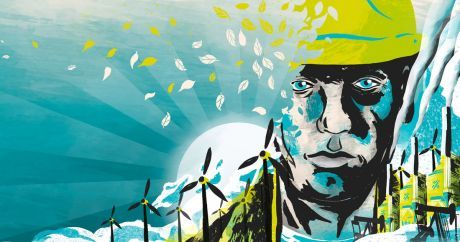Reports
You are here
Iron and Earth: oil sands workers demand climate jobs

April 28, 2016
Since spring of this year a small band of oil sands workers have come together to fight against the growing layoffs in the tar sands and to fight for a greener future. Together they have created Iron and Earth, an initiative led by oilsands workers “who are passionate about building the renewable energy future that Canada needs.”
Iron and Earth is trying to get together the resources to provide training to 1000 unemployed oil sands workers to build solar power. Their plan is to work with “unions, oil and gas companies, clean energy entrepreneurs, contractors, politicians, and other leaders in the energy industry” to create new jobs in green industries despite our governments’ claims that we can have jobs or save the environment, but not both.
This new organization hopes to become a member-driven advocacy organization. Their first annual general meeting will be in July, when they will ratify bylaws and decide on the path for the organization for the next 12 months.
The organization is made up of oil sands workers who have lost their jobs and want to be involved in networks that can create new jobs in renewable industries. Their first project is to retrain 1000 electricians to install solar panels.
The founding director, Lliam Hildebrand, is a boilermaker originally from Victoria. As he explains in the organization’s video, “A fourth generation boilermaker, I grew up on the BC coast and I’m passionate about protecting our environment. I’ve tried to find work in renewable energy, but year after year the only jobs available to me are in the oil and gas sector. While leading industrial nations like China, America and Germany are creating millions of green jobs, Canada is stuck on one idea: the fossil fuel economy. I think that needs to change, and I’m not alone: many of my fellow oil sands workers are starting to think this way. We are skilled workers: electricians, iron workers, pipe fitters, boilermakers, carpenters, and many more trades, and we could easily transfer our knowledge to the green economy.”
In a press conference in April, Hildebrand introduced Iron and Earth and it’s first project. He explained that he and his fellow oil sands workers are grateful for the work they have had and that they “see a place for the oil sands in the Canadian economy into the future.” However since many workers are out of work, it’s time to diversify into renewable energy. “We need policies that will put oil sands workers to work in the renewable energy economy.”
He pointed to his own experience where he could put his training to use on renewable projects without the need for new training. However, some renewable industries will require some retraining. Iron and Earth’s first campaign is their Solar Skills Campaign. The goal is to put 1000 electricians to work installing solar arrays on public buildings. The retaining program that is required will take five days.
Adam Cormier is a journeyman electrician and writer based in St. John’s, Newfoundland, he spoke about the fate of East Coat workers who have migrated to Alberta to work and now can’t find work at home or in Alberta. He pointed out that “the amount of potential renewable energy on the East Coast of Canada is massive.” He announced their plans for a Maritime project in the near future.
Lliam Hildebrand ended the conference by declaring that “We want to be the bridge that is going to tie oil and gas and the environment and the workers to create a future that we can all believe in. We believe that energy development must prioritize the health and equity of workers, their families, our communities, the environment and the economy. And we believe that all of those things can be accomplished. We believe that climate change is a considerable threat and we want to ensure that Alberta and Canada meet their climate targets and exceed them. We believe that meeting these climate targets is going to be the largest job creator that our trades have seen in a long time.”
For more information, and to endorse their campaign, visit www.ironandearth.org
Section:









